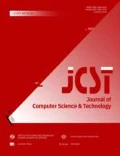Abstract
Knowledge representation and reasoning is a key issue of the Knowledge Grid. This paper proposes a Knowledge Map (KM) model for representing and reasoning causal knowledge as an overlay in the Knowledge Grid. It extends Fuzzy Cognitive Maps (FCMs) to represent and reason not only simple cause-effect relations, but also time-delay causal relations, conditional probabilistic causal relations and sequential relations. The mathematical model and dynamic behaviors of KM are presented. Experiments show that, under certain conditions, the dynamic behaviors of KM can translate between different states. Knowing this condition, experts can control or modify the constructed KM while its dynamic behaviors do not accord with their expectation. Simulations and applications show that KM is more powerful and natural than FCM in emulating real world.
Similar content being viewed by others
References
Stylios C D, Groumpos P P. Fuzzy cognitive maps: A soft computing technique for intelligent control. In Proc. IEEE Int. Symp. Intelligent Control, Patras, 2000, pp.97–102.
Miao Y, Liu Z Q. On causal inference in fuzzy cognitive maps. IEEE Trans. Fuzzy System, 2000, 8(1): 107–119.
Miao Y, Liu Z Q et al. Dynamic cognitive network. IEEE Trans. Fuzzy System, 2001, 9(5): 760–770.
Hagiwara M. Extended fuzzy cognitive maps. In Proc. IEEE Int. Conf. Fuzzy System, San Diego, 1992, pp.795–801.
Kosko B. Fuzzy Engineering. Prentice Hall, 1997.
Chaib-draa B. Causal maps: Theory, implementation and practical applications in multi-agent environments. IEEE Trans. Knowledge and Data Engineering, 2002, 14(6): 1–17.
Pelaez C E, Bowles J B. Applying fuzzy cognitive maps knowledge representation to failure modes effects analysis. In Proc. Annual Reliability and Maintainability Symposium, 1995, pp,450–456.
Liu Z Q, Satur R. Contextual fuzzy cognitive maps for decision support in geographic information systems. IEEE Trans. Fuzzy Systems, 1999, 7(10): 495–502.
Satur R, Liu Z Q. A contextual fuzzy cognitive maps framework for geographic information systems. IEEE Trans. Fuzzy Systems, 1999, 7(10): 481–494.
Noha J B, Lee K C. A case-based reasoning approach to cognitive maps-driven tacit knowledge management. Expert Systems with Applications, 2000, 19: 249–259.
Groumpos P P, Stylios C D. Modeling supervisory control systems using fuzzy cognitive maps. Chaos Solitons and Fractals, 2000, 11: 329–336.
Stylios C D, Groumpos P P. The challenge of modeling supervisory systems using fuzzy cognitive maps. Journal of Intelligent Manufacturing, 1999, 9: 339–345.
Dickerson J A, Kosko B. Virtual worlds as fuzzy dynamical systems. Spring, 1994, 3(2): 173–189.
Leea K C, Lee S A. Cognitive maps simulation approach to adjusting the design factors of the electronic commerce web sites. Expert Systems with Applications, 2003, 24: 1–11.
Zhuge H, Luo X F. Knowledge map model. The Third Int. Conf. Grid and Cooperative Computing (GCC2004), Lecture Notes in Computer Science 3251/2004, pp.381–388.
Obata T, Hagiwara M. Neural cognitive maps. http://citeseer.ist.psu.edu/.
Zhuge H. China’s E-Science Knowledge Grid Environment. IEEE Intelligent Systems, 2004, 19(1): 13–17.
Author information
Authors and Affiliations
Corresponding author
Additional information
Regular Paper This work was supported by the National Natural Science Foundation of China (Grant Nos.60273020, 60402016, and 70271007) and the National Basic Research 973 Program of China (Grant No.2003CB317000).
Hai Zhuge is a professor and director of the Key Lab of Intelligent Information Processing at ICT, CAS, and the founder of the China Knowledge Grid Research Group (http://kg.ict.ac.cn). Currently, he is the chief scientist of the China National Semantic Grid Project. He was keynote speaker at several International Conferences. He was chair of the 2nd International Workshop on Knowledge Grid and Grid Intelligence and program co-chair of the 4th International Conference on Grid and Cooperative Computing (GCC2005). He organized several special issues on Knowledge Grid and Semantic Grid for international journals. He is serving as area editor of the Journal of Systems and Software and Journal of Computer Science and Technology, associate editor of Future Generation Computer Systems, and editorial member of the Information and Management and the Electronic Commerce Research and Applications. His current research interest is model and theory on the future interconnection environment and applications in China. His monograph “The Knowledge Grid” is the first book in the area. He is the author of over ninety papers appeared mainly in leading international conferences and journals. He is listed in the Top 15 software engineering and system scholars in an assessment report published in Journal of Systems and Software in 2005. He is a senior member of IEEE and a member of ACM.
Xiang-Feng Luo’s research fields include knowledge capturing, semantic grid and knowledge grid, artificial intelligence and pattern recognition. Currently he is in charge of a research project supported by the National Natural Science Foundation of China; a research project supported by Innovation Fund of Chinese Academy of Science, and participated several research projects supported by national and provincial science funds.
Rights and permissions
About this article
Cite this article
Zhuge, H., Luo, XF. Knowledge Map: Mathematical Model and Dynamic Behaviors. J Comput Sci Technol 20, 289–295 (2005). https://doi.org/10.1007/s11390-005-0289-5
Received:
Revised:
Issue Date:
DOI: https://doi.org/10.1007/s11390-005-0289-5




